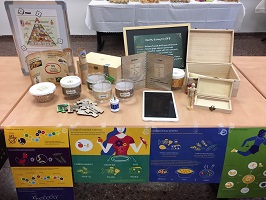Using escape games to get adults and children to think and change their diets
11 December 2019

A new food education project is using the increasingly popular escape room idea to teach children and adults about balanced diets.
The project, EIT Food Games of Food, has been developed by a consortium including experts from the University of Reading has joined forces to create escape game kits that share key information about balanced diets and lifestyle in a memorable and fun way.
The games include Zombie Attack which requires participants to solve puzzles based around sources of protein to help stop an imminent zombie apocalypse.
Dr Natalie Masento an applied psychologist working on the project at the University of Reading shared:
“Escape games such as Zombie Attack offer a great opportunity to share information about balanced diets and health to both children and adults in a fun and engaging way. During our development and testing of Zombie Attack we have also looked at whether a game like this can even change behaviour.”
“Zombie Attack offers some of the key ingredients to change behaviour: players are given a goal to solve the puzzles, they receive feedback and reinforcement as to whether their deduction of nutrition clues was correct and there’s the added elements of social connectivity as people play and share the experience in groups. The Games of Food project aims to not only create a fun game to share information but also a tool that will empower people to consider their own food choices.”
The game has been tested in students across Europe (UK, Poland, Finland, Israel, Belgium) with initial results showing players learnt new information about balanced diets and importantly were motivated to learn more.
Based on this work the Games of Food project are working on a new game focusing on 11-14 year olds that could be used as part of a school lesson.
More information about the EIT Food Games of Food project is available at: https://www.gamesoffood.com/
Further information:
The EIT Food funded Games of Food consortium is led by Technion: Israel Institute of Technology and has partners spanned across Europe: University of Reading, University of Helsinki, University of Warsaw, European Food Information Council (EUFIC) and VTT (Technical Research Centre of Finland).
